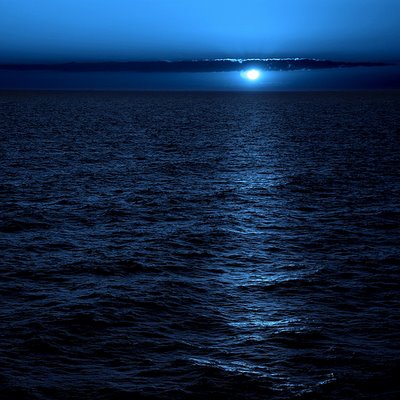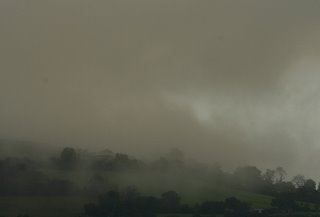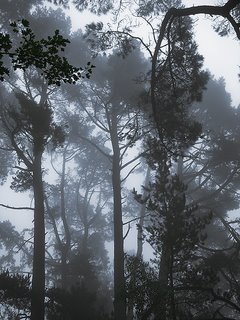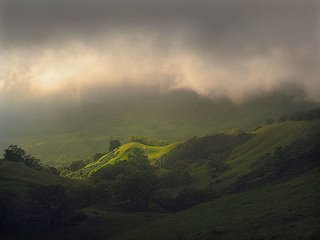 Periodically, in this middle part of my life, I find myself in the midst of a stripping away. It is different than other times of darkness, such as those that come when we move or turn away from God, when there is wrongdoing with which we must deal and confess. It is not the same as the darkness that suddenly descends through the act of a fallen world or person. There is no great pain, sorrow or upheaval that brings it on. It comes in slowly, like a fog developing among the hills or the twilight that comes in a deep wood.
Periodically, in this middle part of my life, I find myself in the midst of a stripping away. It is different than other times of darkness, such as those that come when we move or turn away from God, when there is wrongdoing with which we must deal and confess. It is not the same as the darkness that suddenly descends through the act of a fallen world or person. There is no great pain, sorrow or upheaval that brings it on. It comes in slowly, like a fog developing among the hills or the twilight that comes in a deep wood. I don’t realize I’m in its midst until I find myself worn, muddled and longing for clarity. At first, it’s like muddy water, a swimming hole left behind by ardent swimmers who disturbed its mucky bottom. I’m grumpy and somewhat pessimistic, critical of people, places but mostly me. The disciplines that normally bring me peace or allow me to feel God’s presence no longer “work.” And I’m longing. For clearer days. For articulacy and precision. For sight. Like the blind man sitting on his mat in the dust before Jesus even entered the village. Or the hemorrhaging woman alone in her room before Jesus walks down the street. I’m longing for home, for color, for the onward and upward. For the epic, grandeur and glory of the Story I suddenly fear has left me behind. It’s then I realize what I’m desperately longing and thirsting for is God.
I don’t realize I’m in its midst until I find myself worn, muddled and longing for clarity. At first, it’s like muddy water, a swimming hole left behind by ardent swimmers who disturbed its mucky bottom. I’m grumpy and somewhat pessimistic, critical of people, places but mostly me. The disciplines that normally bring me peace or allow me to feel God’s presence no longer “work.” And I’m longing. For clearer days. For articulacy and precision. For sight. Like the blind man sitting on his mat in the dust before Jesus even entered the village. Or the hemorrhaging woman alone in her room before Jesus walks down the street. I’m longing for home, for color, for the onward and upward. For the epic, grandeur and glory of the Story I suddenly fear has left me behind. It’s then I realize what I’m desperately longing and thirsting for is God.But it’s also then I realize where I am. It’s all an illusion, this sense of being left behind, of isolation and separation. It is like that fog hugging the hills. It will part, revealing the richness, glory and vastness of the Kingdom in which I stand. For I am there even now: I just can’t feel it. God is here. I just can’t feel him. I know, because I’ve been here before. And I’ve learned this is not a darkness to be feared or run from (as if I could). In truth, this darkness is a friend.
Christians don’t talk much about this place, for some reason. I tend to find we often want to explain it away, shake ourselves out of it, or like Job’s friends, make all darkness a result of our own sin. But some Christians have delved into the experience.
 In Embracing the Mysterious God, James Emery White summarizes a bit of the Christian wisdom in explaining this place. It’s been called a dry season. Drawing on C.S. Lewis, White observes it as the result of the law of undulation, an “ebb and flow of our experience of God’s presence” that is normal for us as human beings both emotionally and spiritually. It is unrealistic of us, observes White, to expect to always feel intimate with God—and “unrealistic expectations are relationally destructive.” What to do in times like this? Remember, says White, that “authentic spirituality has more to do with how we respond to emotions than it does with a given emotional state.” And remember that God is always present and “live accordingly.” And think of the distance you feel from God “as a gift—for our instruction or our protection,” a time to grow in faith and trust of who God is.
In Embracing the Mysterious God, James Emery White summarizes a bit of the Christian wisdom in explaining this place. It’s been called a dry season. Drawing on C.S. Lewis, White observes it as the result of the law of undulation, an “ebb and flow of our experience of God’s presence” that is normal for us as human beings both emotionally and spiritually. It is unrealistic of us, observes White, to expect to always feel intimate with God—and “unrealistic expectations are relationally destructive.” What to do in times like this? Remember, says White, that “authentic spirituality has more to do with how we respond to emotions than it does with a given emotional state.” And remember that God is always present and “live accordingly.” And think of the distance you feel from God “as a gift—for our instruction or our protection,” a time to grow in faith and trust of who God is.But this darkness did not become that gift until I stumbled upon the aged-well Dark Night of the Soul by St. John of the Cross, a 16th century Spanish poet and Catholic priest. Dark Night clarifies these seasons of darkness as “habitual times” of God “working in the soul.” He is drawing us closer to him even though it appears we are distant. He is working in the heart to transform, to make us more as he would have us to be. And he’s working in a way we cannot understand, as if (as St. John of the Cross puts it) God is shinning his Light so bright into our souls that we are blinded by it. And thus it appears as Night to us when in actuality it is the brightest of Day.
Part of that Night, explains St. John, is God's removing of whatever it is that keeps us from him—even those things we count as spiritually good, which we can grown dependent upon instead of God. God wants us dependent only on him, because he knows he is the Life and Love we so desperately need. In him are true peace, love, joy and life. So, these times of darkness are a purging of soul, a removing any thing the soul clings to in understanding, delight or reason: “For anything that the soul can do of its own accord at this time serves only, as we have said, to hinder inward peace and the work which God is accomplishing in the spirit by means of that aridity of sense.”
 I, however, am usually a bit dim when it comes to recognizing this darkness. Heh, there were times earlier in my life when I felt its edges and ran as far and fast as I could. Several years ago, however, God moved so strongly I couldn’t run and I finally recognized the Night for what it was. However, even after learning how to wait through it—and then seeing the Kingdom in more brilliance than I’d yet glimpsed—it took me awhile to recognize it again.
I, however, am usually a bit dim when it comes to recognizing this darkness. Heh, there were times earlier in my life when I felt its edges and ran as far and fast as I could. Several years ago, however, God moved so strongly I couldn’t run and I finally recognized the Night for what it was. However, even after learning how to wait through it—and then seeing the Kingdom in more brilliance than I’d yet glimpsed—it took me awhile to recognize it again.This time, the darkness feels like a friend. This oh-so-brilliant darkness brings stillness, rest and solitude. In it is the “be still” and the rest Jesus speaks of for those who labor. That doesn’t mean there aren’t painful moments. (St. John likens it to surgery, which often bring pains even as it heals.) And that doesn’t mean that the soul won’t periodically panic. But, as we learn to live in it, we discover it to be like the best of friends, because God drips from and in it.
 So, I crack open Dark Night again, letting its words remind me where I am. And I wait. And trust. And listen. For I have been here before. Like Job, I have seen him come out of the whirlwind. And that is enough. I know who he is and what he can do. I know he will open my eyes, part the brilliant darkness and I will see I have never left him or he me. He is good. And he is love.
So, I crack open Dark Night again, letting its words remind me where I am. And I wait. And trust. And listen. For I have been here before. Like Job, I have seen him come out of the whirlwind. And that is enough. I know who he is and what he can do. I know he will open my eyes, part the brilliant darkness and I will see I have never left him or he me. He is good. And he is love.(Image: another sunset by OlliK at flickr; fog rolling across solsbury hill by anthonygrimley at flickr; sylvan mist by scampercom at flickr; rolling fog by sierrian at flickr; look deep by AceFrenzy at flickr; some rights reserved for all photos)